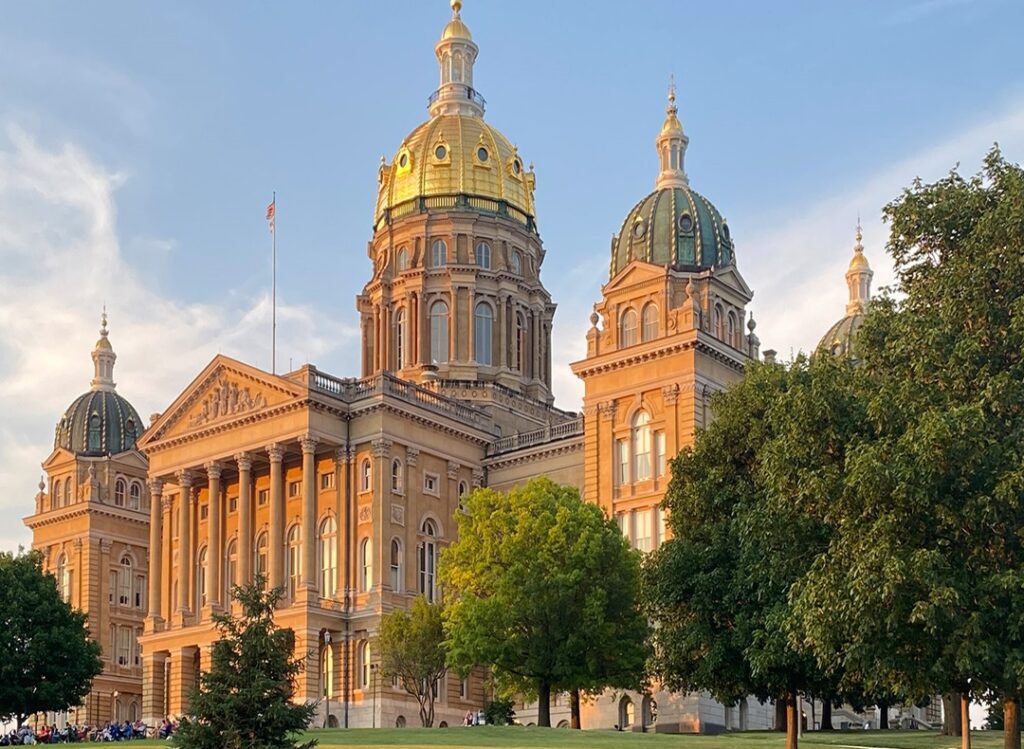Three tax proposals
Watch for a franchise fee hike, property tax reform, or a push for another 1-cent sales tax

Another tax to cover fee refunds?
It may seem ironic, but raising property taxes is one method Des Moines has proposed to refund $40 million in franchise fees – a fee that was created to avoid increasing property taxes.
The city would use part of the increase as a credit against a homeowner’s property tax bill, with the balance going to cash refunds to utility users who are not homeowners.
By the city’s model, for example, a $100 increase in property taxes would be divided this way: $60 would be credited to the property owner and $40 would be used for cash refunds to utility payers.
Another proposal contained in the court filing is to ask the Legislature to raise the franchise fee to 7.5 percent from 5 percent, with the extra amount used to pay the refund. The city also proposes a hybrid of its two proposals.
The Legislature approved such a plan this year, only to have it vetoed by Gov. Terry Branstad, apparently out of concern that such a scheme would interfere with his quest to alter the property tax landscape in the state.
City Attorney Jeff Lester said “there is still a lot of work left to do” to reach an agreement for finally settling the lawsuit.
Kragnes’ lawyer Schroeder would agree, especially if the city continues to seek additional revenues to pay the refund.
In a court filing, Schroeder argues that the city has collected more than $10 million a year since the franchise fee was legitimized by the Iowa Legislature. Some of that money could be used to make refunds.
Schroeder also chided the city for engaging in speculation about whether state lawmakers would again support an increase in the franchise fee.
The city could delay some planned capital expenditures to help pay the refund. There is no need to cut services or add an additional tax for residents.
“It galls me that the city is saying it needs yet another tax increase to pay a tax they weren’t originally allowed to collect,” Schroeder told the Business Record. “I’m not an anti-government guy, but this really sours you on the process.”
Revisting a 1-cent sales tax increase
When Urbandale City Councilman Mike Carver looks at a map of Iowa, he sees lost opportunity.
The map that catches his eye highlights 92 counties that have a local option sales tax – an additional 1 percent on the standard 6 percent sales tax. Among the seven counties not highlighted: Dallas, Polk and Warren counties.
In Carver’s mind, those counties and their cities are missing an opportunity to take some stress off property owners and provide much needed revenue for things like street repair and maintenance, which in Urbandale requires 31 percent of all property tax revenue.
Voters in the three Central Iowa counties rejected a 2007 vote on a local option sales tax that would be administered by a regional authority. The 1 percent sales tax increase would have been used for cultural amenities, parks and other services. Propoents said the local option sales tax would reduce property taxes.
Called Project Destiny, the effort was crushed, with nearly 85 percent of voters in Polk County and 86 percent in Dallas County rejecting the tax. Opponents argued that the tax was unfair to the poor and people on fixed incomes.
A 2008 analysis of municipal tax revenues by the Iowa Policy Project reached the same conclusion. In fact, the Iowa City think tank criticized a range of taxes, including the franchise fee, as being regressive.
The most even-handed way to charge residents for city services and projects is via a graduated income tax, it said in the report.
Carver believes that voters would approve the sales tax increase if they were convinced that the money would be spent on specific services, streets repairs for example.
He also knows that the Project Destiny experience is fresh in the minds of public officials.
“Everybody is afraid to talk about it,” he said.
But not Carver. He brings the subject up in meetings. He has talked to the Metropolitan Planning Organization about analyzing how the sales tax could defray road costs.
Although cities continue to look for alternative sources of revenue, at least one observer believes they should address spending issues first.
“No amount of additional revenue will ever be enough until we control the spending. Until we do control the spending … It will be gone before we can blink,” said Gretchen Tegeler, executive director of the Taxpayers Association of Central Iowa.
Property tax reform, again
Gov. Branstad has said his priority is to reduce property taxes paid by owners of commercial and industrial properties as a way to spur economic development efforts.
In Des Moines, such a plan would further erode city government’s chief source of income.
State Sen. Jack Hatch of Des Moines says he is ready to come back with a better proposal that he hopes will find favor in his chamber and the Iowa House, where majority Republicans carried an aggressive plan favored by Gov. Terry Branstad to cut commercial property taxes by 40 percent.
Hatch is not ready to discuss the proposal in detail, but his concept is to draft a plan that would benefit small businesses and protect property tax revenues that flow to local governments.
The plan would calculate property tax reductions based on “an overall set of incentives” that would spur development.
“I think I’ve got a twist here that no one else has. We’re going to look at providing property tax reduction based on what Iowa wants to value in its manufacturing and business growth areas,” Hatch said.










